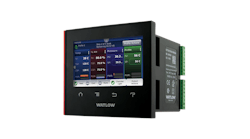With the concept of cloud computing quickly becoming the new norm for consumer and enterprise applications, industry now seems to be raising an eyebrow and seriously evaluating the cost-benefit of leveraging service-based software and information technology infrastructure. Yet, while the economic benefits of cloud computing are undeniable, the historically cautious industrial segment figures to employ cloud-based solutions in a markedly more conservative fashion than what is currently being seen on the consumer and enterprise side.
Cloud Computing Defined
?Cloud computing is an intentionally nebulous phrase for describing the concept of deploying software and IT infrastructure as a service. The core difference between cloud and traditional methods of computing is that data, software and computation over a network are not housed or facilitated via a personal laptop or desktop workstation, but rather they are accessed on a remote server (i.e., in the cloud) via a Web browser or mobile application. The key advantage of cloud computing is that it provides the economies of scale and ability to manage software and databases and infrastructure assets on a system-wide basis, thus providing more flexibility to make changes and updates without having to address each and every device within a given network. For the end-user, this cuts significant cost out of the IT system and application administration process by streamlining the management and deployment of users on a network and eliminating the need for those pesky per-device software licenses.
Areas of Concern
From an industrial perspective, the idea of cloud computing raises some obvious concerns in the form of security and control. Regarding control, some industrial end-users considering the jump into cloud computing will likely be uneasy with the fact that if there is a problem with the network or the applications running on it, they won’t be able to scream and yell at an in-house network admin. Instead, they’ll have to lodge a complaint (i.e., open a ticket) with a third-party provider who may or may not have higher priorities at any given moment. And on the security side, concern over remotely hosting sensitive data is, and will continue to be, an area of significant concern—far more so than it is for consumer and even enterprise end-users. After all, while the compromise of data in a Gmail or SalesForce.com account would certainly be problematic, it isn’t quite on the level of, for example, a security breach in a system responsible for a key pressure control on an offshore drilling platform.
“When we’ve talked about the cloud to our customers, one of the things that they always bring up is the security issue,” says Joe McMullen, product marketing manager for Invensys Operations Management. “They have concerns—and rightfully so—about exposing something to a service that may be subject to hacking.”
Areas of OpportunityThe Invensys cloud architecture allows process and flow network information to be gathered and stored for anytime-anywhere access for reporting or decision-making. A variety of mobile devices can be used to pull information from the cloud.
Image courtesy of Invensys Operations Management
Invensys Operations Management, a provider of automation and information technologies, services, and consulting to global manufacturing and infrastructure industries, is a proponent of industrial cloud computing, and it is working to educate end-users on how cloud-based solutions can be effectively employed to the benefit of plant and field-based systems. Invensys sees the two obvious areas of opportunity for industrial-grade cloud computing as business process management (BPM) and real-time reporting. Invensys believes BPM and real-time reporting are particularly well suited for cloud computing because they are not the sort of critical control-based systems industrial end-users would likely be reluctant to host in the cloud, yet they do provide real value in terms of the potential for improved visibility and responsiveness in a range of process application scenarios.
Along this line, Invensys acquired Skelta Software (skelta.com), a privately held company headquartered in Bangalore, India. Founded in 2003, Skelta provides enterprise-wide business process management (BPM) and advanced workflow software solutions for companies involved in manufacturing and infrastructure operations. Following the acquisition, Invensys this year announced an initiative to migrate the Skelta BPM platform to the Windows Azure cloud as part of an alliance agreement with Microsoft Corp. Through its partnership with Microsoft, Invensys will also be hosting its Wonderware Historian tiered real-time database to the Windows Azure cloud. Wonderware Historian is designed to collect a variety of plant data and present that data in ways that enable effective decision-making in support of productivity improvement initiatives.
In addition, Invensys is working with Sarla Analytics to leverage Sarla’s SmartGlance smart phone/device reporting server and the Wonderware Mobile Reporting Connectors to provide real-time smart phone connectivity to Wonderware Historian and other Invensys data sources, such as MES (Manufacturing Execution Systems) and CEM (Corporate Energy Management) applications. The solution is designed to integrate smart phones and cloud computing to keep plant decision-makers and operators fully aware of the plant’s performance. Data from Invensys’ systems, as well as from a myriad of other plant data sources, can be sent via the cloud to smart phones subscribed to the SmartGlance Mobile Reporting service.?
Virtualization: A Good First Step
The Business Benefits of Industrial Cloud ComputingInvensys Operations Management is offering free half-day seminars on the business benefits and applicability of Azure Cloud Technology in industrial automation. The seminars are designed to show how incremental steps, such as virtualization, offer a clear pathway to cloud computing.
For registration information, click here.
Location, Dates & Time
• Houston, Texas – September 18, 2012
• Minneapolis, Minn. – September 20, 2012
Topics
• Business Benefits & Rationale for Cloud Computing
• Azure Cloud Services for Manufacturers
• ARC Advisory Group: Is Industry Ready for the Cloud?
• Invensys: Collaboration & Reporting in the Cloud
• Sarla Analytics: Analytics in the Cloud
?Why Attend?
• Is it all or nothing? How to use virtualization as an interim step
• Hear Microsoft”s roadmap, updates, plans on bringing cloud computing to industry
• ARC Advisory Group”s Peter Reynolds discusses the impact & influence of the cloud for today”s manufacturers
• See the cloud in action: Smart Glance mobile solutions for cloud-based reporting & KPI management
• Wonderware shares near-term product plans for collaboration & reporting in the cloud
According to Maryanne Steidinger, director of Advanced Applications Product Marketing for Invensys Operations Management, a good first step on the way to hosting IT on the cloud is virtualization. She says that one of the core goals of industrial IT systems going forward is to find ways to strategically roll out applications in ways that enable the deployment and management of multiple users in ways that are both economical and efficient. Virtualization, which essentially takes a piece of software and encapsulates it in a proverbial box so that any software system can run what is inside it, enables industrial organizations to achieve these goals. No longer do users have to worry about buying new hardware and new software to accommodate operating system upgrades, for example. Steidinger says this concept is particularly well suited for industrial end-users, who generally hold onto technology longer than users on the consumer or enterprise side. “What virtualization allows you to do is take a physical product that is running Windows 7, but your software runs on XP, so instead of buying a new OS and hardware, you virtualize,” says Steidinger.
Invensys’s cloud computing initiative is based on a phased approach, whereby Invensys is virtualizing its core industrial applications as a first step. Steidinger says the virtualization piece of Invensys’ strategy for bringing its BPM and mobile reporting solutions to the cloud is expected to be complete by the end of 2012. The second phase, whereby the applications would be hosted natively on the Microsoft Azure cloud, is slated for completion by the end of 2013. ?
McMullen says Invensys’s timeline for cloud computing is in line with what he is hearing from end-users in regard to their goals. He says while most industrial customers don’t yet know exactly how they’re going to get there, they are aiming to be running at least some of their systems on the cloud within two to three years.
The Possibilities
?Given the conservative nature and security concerns of industrial end-users, Steidinger says she doesn’t see real-time control of critical processes ever being handled in the cloud. Rather, she says the flexibility cloud-based solutions offer in terms of the ability to respond and report based on process information holds tremendous potential for industrial end-users. Further, having real-time smart phone access to process information enables end-users to respond to and report on plant performance variables in a more timely manner.
“Once you take those applications and you host them on the cloud, you really are changing the whole paradigm,” says McMullen. “If you can take process information and results and push those results on the cloud and push them to a handheld device, [users] can make quick decisions that will really help improve the efficiency of the process and limit downtime.”
Steidinger says the ability to react efficiently and effectively to process information has never been more critical than it is now. Globalization has made business in general far more competitive than it was even 10 years ago, and, as such, she says it is vitally important for businesses to make fast decisions to provide the most cost-effective end product possible. At the same time, it is equally important for businesses to handle their IT investments in the most cost-effective manner. With cloud computing, much of the expense associated with hardware and software upgrades and compatibility issues can be relieved—and that relief is there not only for consumer and enterprise users, but also for those in the world of industry.
Matt Migliore is the executive director of content for Flow Control magazine. He can be reached at [email protected] or 610 828-1711.?


